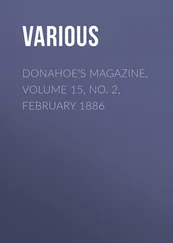Various - Belford's Magazine, Vol. II, No. 3, February 1889
Здесь есть возможность читать онлайн «Various - Belford's Magazine, Vol. II, No. 3, February 1889» — ознакомительный отрывок электронной книги совершенно бесплатно, а после прочтения отрывка купить полную версию. В некоторых случаях можно слушать аудио, скачать через торрент в формате fb2 и присутствует краткое содержание. Издательство: Иностранный паблик, Жанр: periodic, foreign_edu, на английском языке. Описание произведения, (предисловие) а так же отзывы посетителей доступны на портале библиотеки ЛибКат.
- Название:Belford's Magazine, Vol. II, No. 3, February 1889
- Автор:
- Издательство:Иностранный паблик
- Жанр:
- Год:неизвестен
- ISBN:нет данных
- Рейтинг книги:5 / 5. Голосов: 1
-
Избранное:Добавить в избранное
- Отзывы:
-
Ваша оценка:
- 100
- 1
- 2
- 3
- 4
- 5
Belford's Magazine, Vol. II, No. 3, February 1889: краткое содержание, описание и аннотация
Предлагаем к чтению аннотацию, описание, краткое содержание или предисловие (зависит от того, что написал сам автор книги «Belford's Magazine, Vol. II, No. 3, February 1889»). Если вы не нашли необходимую информацию о книге — напишите в комментариях, мы постараемся отыскать её.
Belford's Magazine, Vol. II, No. 3, February 1889 — читать онлайн ознакомительный отрывок
Ниже представлен текст книги, разбитый по страницам. Система сохранения места последней прочитанной страницы, позволяет с удобством читать онлайн бесплатно книгу «Belford's Magazine, Vol. II, No. 3, February 1889», без необходимости каждый раз заново искать на чём Вы остановились. Поставьте закладку, и сможете в любой момент перейти на страницу, на которой закончили чтение.
Интервал:
Закладка:
Various
Belford's Magazine, Vol. II, No. 3, February 1889 Dec 1888-May 1889
A FEW PRACTICAL FACTS FOR SENATOR EDMUNDS
I am a physician practising in a small manufacturing town, and am doing very well so far as getting business goes – might even be able to save a little money if it were not for the bad debts. They make my income pretty small, considering the amount of hard work I am compelled to do; and the time spent in endeavoring to collect my bills takes a great many hours which, in justice to my patients who pay, ought to be used in brushing up my medical studies and trying to keep abreast with the rest of the profession.
It is hard to get out of a warm bed at night and tramp off a mile or so to look after a patient when you are not certain of ever getting your pay, and it seems to grow worse instead of better. The number of people who, because of their poverty, need a doctor the most are on the increase; and yet so long as they are not poor because of vicious habits, one really hasn't the heart to refuse when called upon. I hear a great deal said about the prosperity of the workingman and the high wages he receives, but observe as a matter of experience that only a few are able to save enough to carry them through a few weeks' illness, let alone paying the doctor, who is forced to wait months and sometimes even years for his pay, getting it then a dollar or two at a time.
To be sure, some of my patients own homes of their own, but the most of them are in debt, a mortgage being about as regular an attachment to a workingman's house as a chimney.
Wages, too, are not quite so high as they were when I began practice: they fell pretty low at one time, and then, when human nature could endure it no longer, came a strike. The employers were horrified; there never had been a strike in this town before: the working men, women, and children all received high wages. "There is John Smith, for instance – earns eighty dollars a month. There is Miss Jones, who makes two dollars a day. There are some who earn even more." True enough! But one day I was called to see John Smith lying dead on his kitchen floor; fell dead on coming home from work, died in the harness, worked to death; a young man at that, and ought to have been good for twenty years more. His employers wouldn't have allowed one of their horses to work that way.
I remember the first time I ever saw Miss Jones – a bright, pretty, red-cheeked girl, fresh from the country and proud to think that she could earn her own living; to-day you would not recognize her, bent, haggard, and worn; the rosy cheeks all gone; and the sunken chest and hollow cough too plainly prophesy the end is not far off. High wages? Yes! for flesh and blood are cheap.
Well, the strikers compromised, got a raise in wages of five per cent., with pay once a month instead of half at the end of the month, and the balance at the end of the year, as had been the custom. Most of the employers gave up the "pluck-me store" system, and we had better times.
Every year there comes family after family, all skilled working men and women, from over the ocean, and I begin to see men standing on the street corners looking for work, while every now and then one of the employers will cut down wages a little in some department of his factory.
I see the men and boys who were born here crowded out of their places by the imported labor, leaving town, and later hear of them beginning life over again in some western village, or taking up government lands on the prairies. If it were not for the emigration out of the town, wages would scarce be enough to support life, so fast does immigration to the town keep up with the demand for labor.
The place used to be full of little shops, and the business was conducted by hundreds of small manufacturers who were but one remove from their men; in fact, it was no uncommon thing for a man to begin manufacturing for himself on the savings from two or three years' labor.
But now these small shops are used as tenements, and a dozen large firms do nearly all the business, crowding the few small manufacturers that are left closer and closer to the wall every year. This is because much of our raw stock has to be imported: we can make only a few kinds of our class of goods in this country. The large manufacturer, who is generally an importer also, is thus able to offer a full line of goods to the jobber, which the smaller fry can't do.
The business is a highly protected industry, the people being taxed by a tariff of fifty per cent to support it.
In this connection a few figures may prove instructive:

The tariff of fifty per cent is sufficient therefore to enable the manufacturer to pay, not the difference in wages between European labor and American, but all the wages and twenty-eight cents on the dollar's worth of finished product besides; while – there being no tariff on labor – foreign labor comes to compete with home labor just so fast as the difference in wages will warrant the making of the journey from the old country to the new.
The tariff on gloves in an unfinished state is, however, but twenty per cent, and at that rate many gloves are imported so nearly finished as to require but little labor to fit them for the market: and here the large dealer who imports is able to obtain another serious advantage over the small dealer, and at the same time, while pretending to protect labor, defraud it.
The closing of the small shops, and the consequent driving of our people into large factories, hurts the best skilled workman in that it lessens the number of employers competing for his services. I have been a protectionist in the past, for I was taught to believe that protection raised wages; but the results of a careful inquiry as to cause and effect have shown me pretty conclusively that it does not and can not.
I have talked with many workingmen who are beginning to perceive that the tendency of wages to fall a little from time to time is due to the competition of the "pauper labor of Europe," which coming to this country, underbids them at the shop door, takes away their work, and turns them out to shift for themselves; while the employer, who is protected by a duty of fifty per cent, gets his labor in the lowest market and sells his goods in the highest.
Said a glove-cutter to me the other day: "Doctor, if all the workingmen born and brought up here and all that have come from the old country had remained here, wages would not be fifty cents a day. I understand very well what keeps wages up in America: it's the great West, with its free land acting as a safety valve; and the worst is that so much of it has been given to railroads or sold to cattle syndicates for a mere song. When the remaining free land is appropriated, God help the workingman!
"Yes, we're protected in all that we have to buy: food, clothing, and shelter, in a way that increases the cost to us; but in what we have to sell, our labor, we have no protection at all. They give us good wages, for if they did not we would emigrate to the West and leave them, and by reason of this confounded tariff they put up the price of all we need so high that wages, measured by their purchasing power, are not so large after all. If the difference in real wages was so great as the protectionists claim, there would be more immigrants coming from Europe in one day than do now in a year."
The workingmen have been educating themselves in the last four years, and are no longer to be deceived by superficial comparisons of the differences in wages between countries; they will also examine into the differences in conditions, productive power, and the like, which the protectionist statistician omits to do.
Читать дальшеИнтервал:
Закладка:
Похожие книги на «Belford's Magazine, Vol. II, No. 3, February 1889»
Представляем Вашему вниманию похожие книги на «Belford's Magazine, Vol. II, No. 3, February 1889» списком для выбора. Мы отобрали схожую по названию и смыслу литературу в надежде предоставить читателям больше вариантов отыскать новые, интересные, ещё непрочитанные произведения.
Обсуждение, отзывы о книге «Belford's Magazine, Vol. II, No. 3, February 1889» и просто собственные мнения читателей. Оставьте ваши комментарии, напишите, что Вы думаете о произведении, его смысле или главных героях. Укажите что конкретно понравилось, а что нет, и почему Вы так считаете.












